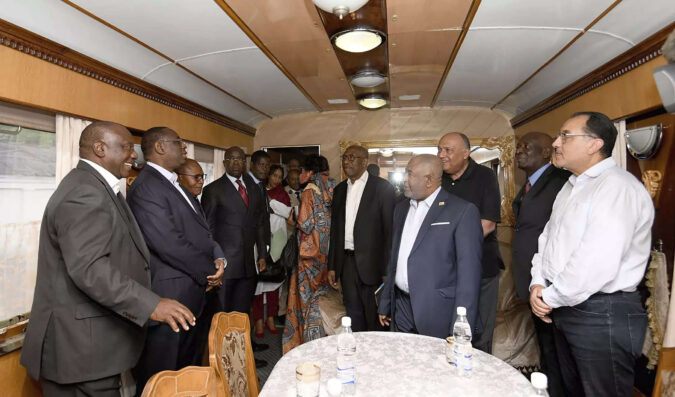JOHANNESBURG: South African President Cyril Ramaphosa on Monday hailed an African mission to broker peace in Ukraine as “historic” in an effort welcomed by France.
Ramaphosa made the remark on his return from talks in the Ukrainian capital Kyiv and Russian city of Saint Petersburg that however did not yield any immediate results.
The high-profile delegation of presidents and envoys met Ukrainian President Volodymyr Zelenskyy on Saturday before flying to Russia to speak with Russian counterpart Vladimir Putin on Sunday.
“Any peace effort is positive if it aims to restore the principles of the UN Charter” with the “goal of a just and lasting peace,” French Foreign Minister Catherine Colonna told reporters on a visit to Pretoria Monday, dodging journalists’ questions over Pretoria’s close ties to Russia.
A continental powerhouse, South Africa has refused to condemn the invasion of Ukraine which has largely isolated Moscow on the international stage, saying it wants to stay neutral and prefers dialogue to end the war.
The African leaders’ mission brought the voice of a continent that has badly suffered from repercussions of the Ukraine conflict, particularly with rising grain prices.
It put forward a 10-point proposal, including de-escalation, the recognition of countries’ sovereignty, unimpeded grain exports through the Black Sea and sending prisoners of war and children back to their countries of origin.
But the principles were deemed “very difficult to implement” by the Kremlin, while Zelensky ruled out talks with Moscow as long as Russian troops occupied Ukrainian territories.
On Monday, Ramaphosa said in his weekly newsletter that “this initiative has been historic in that it is the first time African leaders have embarked on a peace mission beyond the shores of the continent”.
He said “one of the key achievements” of the mission “was the positive reception” received from both sides, “which provides cause for optimism that the proposals will be given consideration.”
Both Zelenskyy and Putin have agreed to further engagements, he said.
Efforts to secure peace appear increasingly perilous, analysts told AFP, with both Kyiv and Moscow convinced they can win on the battlefield.
Ukraine launched a long-awaited counteroffensive earlier this month.
Ramaphosa expressed hope that “a foundation can be set for a de-escalation of the conflict and negotiation”.
The diplomatic team included the presidents of South Africa, Senegal, Comoros and Zambia, as well as top officials from Uganda, Egypt and Congo-Brazzaville.
South African Foreign Minister Naledi Pandor denied rumours at the joint press conference with her French counterpart that the African peace plan includes a proposal to suspend an international arrest warrant against Putin.
“There’s no such thing,” she said.
The International Criminal Court warrant against Putin stems from accusations that Russia unlawfully deported Ukrainian children.
Ramaphosa made the remark on his return from talks in the Ukrainian capital Kyiv and Russian city of Saint Petersburg that however did not yield any immediate results.
The high-profile delegation of presidents and envoys met Ukrainian President Volodymyr Zelenskyy on Saturday before flying to Russia to speak with Russian counterpart Vladimir Putin on Sunday.
“Any peace effort is positive if it aims to restore the principles of the UN Charter” with the “goal of a just and lasting peace,” French Foreign Minister Catherine Colonna told reporters on a visit to Pretoria Monday, dodging journalists’ questions over Pretoria’s close ties to Russia.
A continental powerhouse, South Africa has refused to condemn the invasion of Ukraine which has largely isolated Moscow on the international stage, saying it wants to stay neutral and prefers dialogue to end the war.
The African leaders’ mission brought the voice of a continent that has badly suffered from repercussions of the Ukraine conflict, particularly with rising grain prices.
It put forward a 10-point proposal, including de-escalation, the recognition of countries’ sovereignty, unimpeded grain exports through the Black Sea and sending prisoners of war and children back to their countries of origin.
But the principles were deemed “very difficult to implement” by the Kremlin, while Zelensky ruled out talks with Moscow as long as Russian troops occupied Ukrainian territories.
On Monday, Ramaphosa said in his weekly newsletter that “this initiative has been historic in that it is the first time African leaders have embarked on a peace mission beyond the shores of the continent”.
He said “one of the key achievements” of the mission “was the positive reception” received from both sides, “which provides cause for optimism that the proposals will be given consideration.”
Both Zelenskyy and Putin have agreed to further engagements, he said.
Efforts to secure peace appear increasingly perilous, analysts told AFP, with both Kyiv and Moscow convinced they can win on the battlefield.
Ukraine launched a long-awaited counteroffensive earlier this month.
Ramaphosa expressed hope that “a foundation can be set for a de-escalation of the conflict and negotiation”.
The diplomatic team included the presidents of South Africa, Senegal, Comoros and Zambia, as well as top officials from Uganda, Egypt and Congo-Brazzaville.
South African Foreign Minister Naledi Pandor denied rumours at the joint press conference with her French counterpart that the African peace plan includes a proposal to suspend an international arrest warrant against Putin.
“There’s no such thing,” she said.
The International Criminal Court warrant against Putin stems from accusations that Russia unlawfully deported Ukrainian children.
